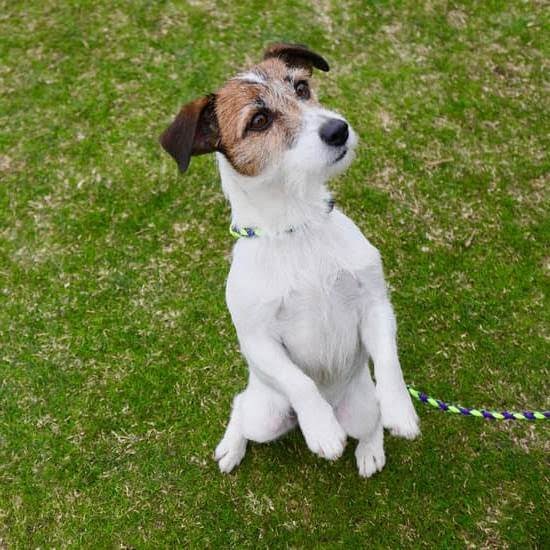Introduction
Training your dog can be a time consuming and challenging task, however often times it’s worth taking the time to implement yourself. Doing this helps create a strong bond between you and your pup, as well as instills trust between the two of you. That being said, there are certainly pros and cons to letting other people help train your dog with you.
Pros: One of the major pros that come with having another person help train your dog is access to an outside perspective. This outside perspective may be able to offer new advice or techniques that may otherwise be harder for you to teach on your own. Additionally, having someone else help in the training process could shorten the overall duration of teaching your pup behaviors or commands, due to having two (or more) individuals involved. It can also be beneficial if the person helping has prior experience in professional dog-training; they would have more informative advice about how best to go about handling certain situations.
Cons: The main con associated with having other people help in training your pup is that it is much more difficult for you and the pet to form a solid relationship based upon understanding each other’s behavior and emotions when too many voices get involved. The difficulty in forming this bond means it will take longer for them to master certain tasks and commands that require trust between handler and pet. Furthermore, introducing too many people into an already sensitive relationship could result in confusion for your pup since all trainers may have varying instructions or types of reinforcement methods when working through specific activities/behaviors.
Types of Professional Trainers and Their Expertise
There are various types of professional dog trainers, each specializing in different areas.
Positive Reinforcement Trainers specialize in reward-based training based on operant conditioning. They use treats, toys and verbal praise to build good behaviors and habits in the dog. They tend to be more patient and encouraging in their approach.
clicker Trainers rely heavily on specific clicker training tools as a way of communicating with the pup. When they want to reinforce desirable behavior, they will make a clicking noise followed by a treat or toy as a reward. Clicker trainers focus on helping dogs understand what behaviors are expected of them and earning rewards for those desired behaviors. This method is considered humane since it does not involve punishment or physical reprimands but rather focuses on building a trusting relationship between the trainer and dog.
Agility Training involves teaching a dog agility course instruction including contact equipment (jumps, tunnels, etc.), obstacle negotiation and basic obedience skills at high intensity levels. Agility dogs must also have maintained health since demanding obstacles require strength and coordination from the pup. By progressing through an agility course, agility trainers help build problem solving, impulse control and confidence in dogs.
Service Dog Trainers are certified professionals who have experience working with service dogs for individuals with special needs such as physical disabilities, hearing impairment or assistance with daily activities that improve quality of life for those dealing with chronic illnesses or developmental delays. These trainers focus on providing highly specialized care to ensure appropriate etiquette around strangers as well as proper coordination between human handler commands and pup responses while out in public settings
Benefits of Having a Specialist Train Your Dog
Having a professional dog trainer work with your pup has many benefits. One of these is that trainers are knowledgeable in the specific behavior and commands you will want your dog to learn. They can also provide tailored guidance for each individual pup, since all dogs have different personalities and respond to different techniques. Plus, depending on the amount of time and effort you can dedicate to training your pet, having another person to help can be very useful in speeding up the process. Additionally, when you are having trouble with your pet’s obedience or understanding their behaviors, they can offer logical advice tailored to your individual situation and overall goals as a pet owner. Finally, a specialist will be able to help develop good communication habits between you and your dog from day one which is important for an enjoyable relationship between pet and owner.
Common Challenges and Mistakes to Avoid
One of the biggest challenges when other people train your dog is setting realistic expectations. Training a dog takes consistent dedication and practice. Reaching desired behavior goals isn’t something that happens overnight, and if you expect a fully trained pet after their first session with a professional, you may be disappointed.
Another challenge to consider is potential personality clashes between the trainer and your pup. If the two don’t click well, they won’t get anywhere in terms of progress and learning. You should do your research on various trainers to find one that matches nicely with your furry companion before investing in lessons.
To avoid any conflict or confusion during training, consistency is key for both you and the trainer. Make sure that you communicate effectively so everyone is on the same page about what commands are being used and how to properly reward your pup for good behaviors. Additionally, it’s important to ensure “stay” command means the same thing from either person otherwise things can become very mixed up by having two different meanings for one command word. Finally, make sure all involved take adequate time breaks — training should not be too hard nor too restrictive causing anxiety or stress in either yourself or your pet!
Factors to Consider When Choosing the Right Trainer for Your Dog
When selecting a trainer for your dog, it’s important to consider several factors. First, decide what type of training you are looking for; do you require basic obedience or specialized skills such as solving behavior issues? This will narrow down your options and help you find a trainer who has expertise in the field you need. It is also critical to investigate the functional experience and credentials of any potential instructor. Ask how long they have been training dogs, the methods they employ, and whether they offer references or testimonials from previous clients.
Another factor to consider when choosing a dog trainer is their schedule and location. Look for trainers that are close by and can accommodate your availability since consistency is key to effective canine education. Additionally, be sure to review the cost of services and any payment policies associated with particular trainers before making a decision so that the costs fit within your budget. Finally, be sure to meet or speak with the potential trainer prior to signing up for training sessions. This will give you an opportunity to ensure that you are comfortable working together long term.
Setting a Training Plan and Setting Clear Goals
When you are thinking of other people training your dog, it is important to establish a training plan and set clear goals. By having a solid plan, it will help ensure that everyone involved in the dog’s training is on the same page. First, decide what specific behaviors you would like your dog to learn. This could include basic obedience commands such as sit and stay or more advanced ones such as recall and agility. Write down the goal for each behavior so that everyone can refer back to the goal to ensure progress is being made. Additionally, create a timeline for when each behavior should be achieved so that progress can be tracked and changes can be made quickly if needed. When working with someone else on training, also discuss responsibilities and expectations clearly so that both parties understand their role. Making sure there is open communication between yourself and other trainers or instructors who are involved with your dog’s training is essential for success.
Be Realistic About Training and Understand the Process
Before embarking on a path that involves enlisting a third party to help you train your dog, it is important to be realistic about the process. Training will take time and commitment from both you and the trainer. Having another person educate your dog can be beneficial, as it brings in an experienced, unbiased opinion about any issues you may be having with your pup. However, it is essential to remember that just because someone else knows how to train dogs, does not mean the process will happen overnight. It may take several sessions with the trainer and many more consistent sessions at home with you before your dog is able to demonstrate what they have learned in various environments. Additionally, keep in mind that each dog learns differently and at different paces as no two are alike. Developing clear goals with your trainer prior to starting will help ensure both parties are on the same page when it comes to training expectations, which helps make reaching those goals within a certain amount of time much more feasible. The parent-dog relationship should never be underestimated and while the guide of an expert can be invaluable, real success depends on parental involvement in reinforcing positive behaviors throughout the entirety of training.
Tips to Make the Training Session Successful
1. Allow the trainer to observe your dog’s behavior before introducing any new commands or activities. The trainer can get an understanding of your dog’s temperament and learn its personality to tailor the training programme more effectively.
2. Explain your expectations clearly, as this will give the trainer a clear understanding of what you wish for, and therefore a better opportunity to devise the best plan for success.
3. Support your dog throughout the process by offering verbal praise after successful commands have been completed or rewards in forms of toys, treats or games to keep their motivation high; this could be done during the actual sessions or between them if there are frequent ones.
4. Be prepared to take on some responsibility when it comes to reinforcing the new behaviours outside of those practice sessions; consistency is key! Make notes on any potential triggers that could cause behavioural issues so that you can address them at a later stage with support from the professional being hired in order to strengthen progress being made towards desired results.
5. Most importantly, understand that success may not always be achieved within a single session and all dogs learn differently, so stick with it – patience and confidence are essential for both you and your pup to successfully conquer any challenges together!
Is Professional Training Necessary?
The answer to that question depends on several factors. Professional training can help to ensure that your dog is properly trained and socialized. Depending on the breed and age of your dog, they may require different types of training, so the best way to determine what kind and how much training is best for them is by consulting with a professional dog trainer. If you are an inexperienced owner, or if your pup has displayed aggressive behaviors or bad habits, hiring a professional can be invaluable in teaching your dog appropriate behavior. Additionally, depending on the specific needs of your pup, professional trainers offer customized services such as obedience classes, puppy socialization classes, and more specialized services such as aggression management. Professional trainers also offer guidance and support in helping you understand how to teach your pup commands and develop better communication between both of you. Ultimately, only you know whether bringing in a professional trainer would help bring out the best characteristics in your furry friend.
Conclusion
When considering whether or not to let other people train your dog, it is important to remember that ultimately you know what is best for your pet. As such, when choosing a trainer and determining the type of training program that you would like for your dog, it is essential that you do your research, assess the different options available, and make an informed decision on which option will be best for the physical and mental wellbeing of your four-legged companion. Consider discussing with your veterinarian any health conditions that may affect their learning as well as seeking recommendations from experienced dog owners in order to make sure that you have chosen the most suitable program for your pup. Moreover, always be certain to inquire about methods used by the trainer to ensure that they practice ethical and humane training techniques. Ultimately this process will enable you to provide your beloved pup with an enriching experience that can hopefully help them develop better behaviors while still contributing positively to their development both mentally and physically.

Welcome to the blog! I am a professional dog trainer and have been working with dogs for many years. In this blog, I will be discussing various topics related to dog training, including tips, tricks, and advice. I hope you find this information helpful and informative. Thanks for reading!





